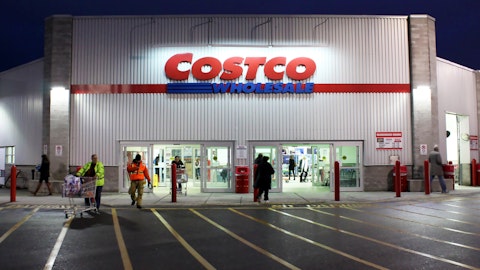Patient Capital Management, a value investing firm, released its “Patient Capital Opportunity Equity Strategy” second quarter 2023 investor letter. A copy of the same can be downloaded here. The strategy had a strong performance in the second quarter, returning 13.31% net of fees compared to the S&P 500’s 8.74% gain. The strategy grew 20.91% over the last year, compared to a 19.59% increase for the market. In addition, you can check the top 5 holdings of the fund to know its best picks in 2023.
Patient Capital Opportunity Equity Strategy highlighted stocks like Costco Wholesale Corporation (NASDAQ:COST) in the second quarter 2023 investor letter. Based in Issaquah, Washington, Costco Wholesale Corporation (NASDAQ:COST) engages in the operation of membership warehouses. On October 4, 2023, Costco Wholesale Corporation (NASDAQ:COST) stock closed at $571.80 per share. One-month return of Costco Wholesale Corporation (NASDAQ:COST) was 4.23%, and its shares gained 18.51% of their value over the last 52 weeks. Costco Wholesale Corporation (NASDAQ:COST) has a market capitalization of $253.189 billion.
Patient Capital Opportunity Equity Strategy made the following comment about Costco Wholesale Corporation (NASDAQ:COST) in its Q2 2023 investor letter:
“Many technicians and quantitative strategists expect growth stocks to continue to outperform. There’s a good shot that’s right but longer term, we remain more optimistic on classic value. People remain enamored with growth investing. Value stocks trade at a discount to historical valuations unlike growth stocks, which trade at a premium.
Take two high quality stocks as an example, Costco Wholesale Corporation (NASDAQ:COST) (“growth”) vs. JPMorgan (“value”). Costco (COST) has a long history of excellent performance, earning attractive returns on capital with consistent growth. Over the past 30 years, it’s grown earnings per share at 9% per year, but it’s compounded capital at better than 16% annually as the P/E multiple expanded from ~12x to 37x this fiscal year’s earnings. Sell-side consensus expects EPS growth to continue at roughly the same rate for the next 5 years. If it sustains the current multiple, the 9% implied return would be solid. But with valuations near all-time highs, and interest rates on the rise, there’s clear risk to that valuation.
Costco’s P/E grew from 18x to 37x during the same time JPMorgan’s fell from 12x to 10x. This makes sense to a certain extent because while both companies delivered improving returns on capital, Costco’s improved more. Valuations are sensitive to interest rates. Since JPM experienced no valuation expansion, it also seems to have less valuation risk.
We can calculate the justified P/E based on return on capital, cost of capital and growth rate. For companies with very high returns on capital and strong growth (like Costco), very high P/Es can be justified, especially in a low interest rate environment. We also analyze market implied expectations by calculating the implied growth rates. For Costco, it’s about 5.3% – in perpetuity! That seems elevated to us! For JPMorgan, it’s less than 0.5%. Way too low in our opinion.”

Costco Wholesale Corporation (NASDAQ:COST) is not on our list of 30 Most Popular Stocks Among Hedge Funds. As per our database, 67 hedge fund portfolios held Costco Wholesale Corporation (NASDAQ:COST) at the end of second quarter which was 63 in the previous quarter.
We discussed Costco Wholesale Corporation (NASDAQ:COST) in another article and shared the list of dividend stocks of 2023. In addition, please check out our hedge fund investor letters Q2 2023 page for more investor letters from hedge funds and other leading investors.
Suggested Articles:
- 20 Biggest Logistics Companies in the US
- Top 20 Most Beautiful Island Countries in the World
- 20 Most Profitable Small Businesses to Start in 2023
Disclosure: None. This article is originally published at Insider Monkey.





